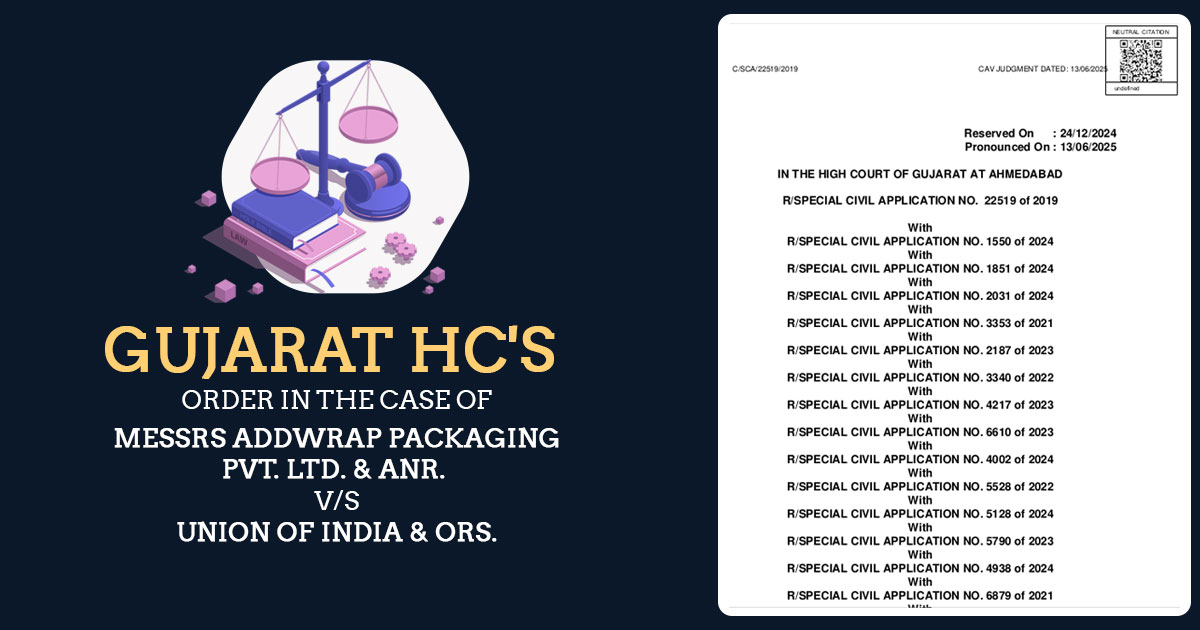
The Gujarat High Court has ruled that a specific rule in the tax regulations, known as Rule 96(10) of the CGST Rules, 2017, will apply going forward, but can also be used in current cases that are still being processed.
The Division Bench of Justices Bhargav D. Karia and D.N. Ray on the issue said that, where a group of petitions have contested the vires of Rule 96(10) of the Central/State Goods and Services Tax Rules, 2017 as replaced from the Central Goods and Services Tax (12th Amendment) Rules, 2018 w.e.f 9.10.2018.
The taxpayer is in the business of manufacturing, supplying/exporting conductors and Optical Fiber Ground Wires (OPGW), and has been working for years and exporting a considerable quantity of finished goods manufactured to its customers who are present all over the world.
The taxpayer that uses the inputs and the capital goods which before coming into the force of the Central Goods and Services Tax Act, 2017 w.e.f 01.07.2017, were leviable to Central Excise duty under the Central Excise Act, 1944 and the input services utilized via the taxpayer was leviable to service tax under the Finance Act, 1994.
Under the Cenvat Credit Rules, 2004, the taxpayer can take credit of taxes paid via them on inputs, capital goods, and input services.
Upon the goods being cleared by the taxpayer in the domestic market, and for payment of duties applicable during export of goods, the Cenvat Credit taken via the taxpayer was in turn used for excise duty payment.
The taxpayer under the norms of the Advance Authorisation Scheme was not obligated to file any customs duty on raw materials imported using such licenses, and hence, no Cenvat credit of any customs duty like CVD, Education and other Cesses, Special Additional Duty (SAD) was taken via the taxpayer.
A rebate/refund claim of IGST filed on goods and services exported out of India has been claimed by the taxpayer.
Towards the taxpayer’s case, concenring substitution of Sub-rule(10) of Rule 96 of the CGST Rules, the taxpayer’s right to claim refund of IGST paid on the whole goods exported by the taxpayer was curtailed if the supplier of any of the inputs to the taxpayer claiming refund has taken advantage of IGST exemption under Notification No.78/2017-Customs dated 13.10.2017 (EOU Scheme) or Notification No.79/2017-Customs dated 13.10.2017 (Advance Authorisation and EPCG scheme) as well as Notification No. 48/2017- Central Tax dated 18.10.2017 for claiming benefit of deemed export or merchant export Notification no. 40/2017 dated Central Tax (Rate) dated 23.10.2017 and Notification No. 41/2017 Integrated tax (Rate) dated 23.10.2017.
As per the taxpayer, the said Notification has omitted Rule 96(10) w.e.f the issuance date of the notification, i.e., 8th October, 2024, matters which are due before the court shall be controlled via the notification or alternatively, they mentioned the notification shall be applicable retrospectively.
The bench referred to the case of Rayala Corporation (P) Ltd. and M.R. Pratap v. Director of Enforcement, New Delhi reported in (1969) 2 Supreme Court Cases 412 said that “omission” shall be contained in the interpretation of word “repeal” and therefore omission of Rule 96(10) w.e.f 8th October, 2024, shall directed to repeal without any saving clause.
Read Also: Gujarat HC: No Fresh GST ITC Demand Without GSTN Verification if Reversal Done Before SCN
General Clauses Act, 1897 is established on the English Interpretation Act, 1889 and as per the same law, the effect of repealing a law was to obliterate it from the records of Parliament as if it had never been passed, excluding for the purpose of those actions, which were started, prosecuted and concluded while it was an existing law.
The repeal without any saving clause shall destroy any proceedings, whether or not yet started or whether due during the legislation of the repealing act and not prosecuted before a final ruling to make a vested right, the bench cited.
Through the Notification No.20/2024 Rules, 2024 have been notified, and as per Rule 10 of the said Rules, Rule 96(10) of the CGST Rules has been omitted with possible effect.
Three situations have arisen from the same: firstly, whether it shall be applicable retrospectively, or secondly, prospectively, or thirdly, it would be applicable prospectively but also to “pending proceedings”. Prospectively, Rule 10 of the Rules 2024 shall be applied and is to apply to the pending proceedings.
The bench said that “Notification No.20/2024 dated 8th October, 2024 would be applicable to all the pending proceedings/cases meaning thereby that Rule 96(10) would stand omitted prospectively but applicable to pending proceedings/cases where final adjudication has not taken place.”
The bench, given the above, has permitted the petition.
| Case Title | Messrs Addwrap Packaging PVT. LTD. & ANR. vs. Union of India & ORS. |
| Case No. | R/SPECIAL CIVIL APPLICATION NO. 22519 of 2019 |
| For the Appearance | Mr. V.Sridharan, Mr. Anand Nainawati, Mr.Sahil Parghi, Mr. Ashish K.Vadodaria, and Mr. Uchit Sheth |
| For the Respondents | Mr. Devang Vyas, Mr. Siddharth Dave, Mr. Utkarsh Sharma, and Mr. C.B.Gupta, Mr. Chirayu Mehta |
| Gujarat High Court | Read Order |